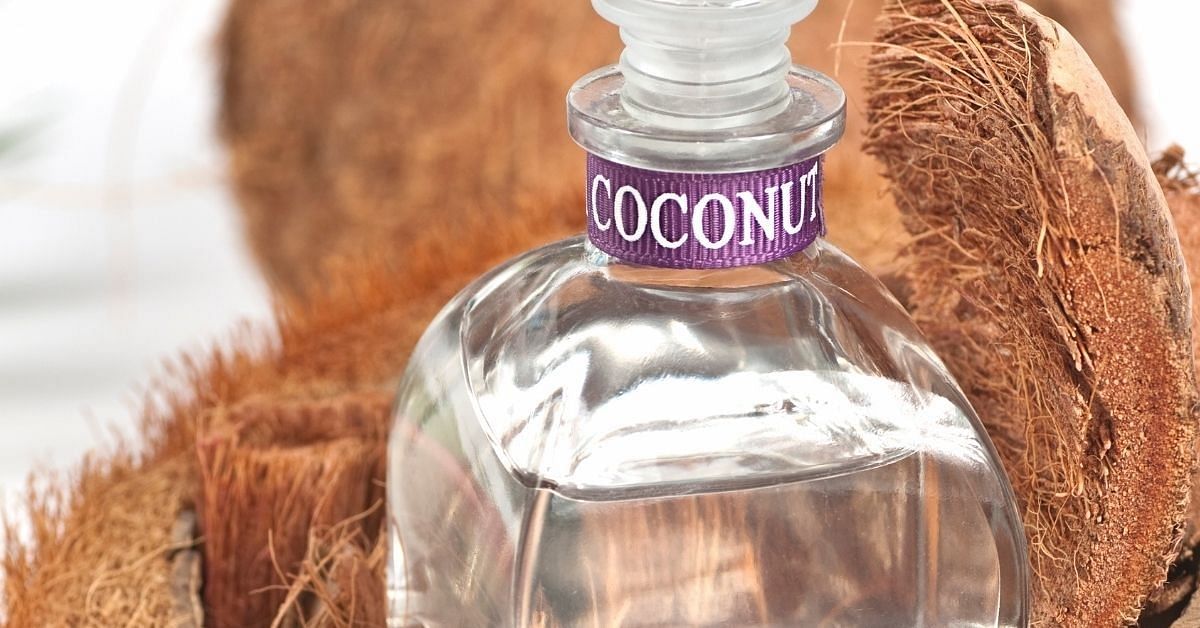Is Coconut Oil for Penis Safe? - Answered by a Sexologist
Coconut oil for the penis has become a widely popular lube due to its easy-slip properties. Is applying coconut oil on the penis safe? Read further to know more about this.

Is Coconut Oil for Penis Safe?
Coconut oil doesn't pose any risk to sensitive vaginal and vulvar tissue. However, one must consider using organic, unrefined, unprocessed coconut oil for penis. The least processed forms of coconut oil are preferred as they decrease the chances of causing skin allergies like rashes and blistering.
It is recommended that one must undergo a patch test before using coconut oil. This will help to know if one is allergic to coconut or not.
Coconut oil for penis acts as a natural lubricant and is exceptionally moisturising. It is helpful for people who experience dryness while entering the vagina. However, one must be careful when using it with a condom, as mineral oils are known to decrease the strength of condoms.

1. Choose Unprocessed Coconut Oil
For any product that has to be used topically, the ideology of “the more natural the extract, the better the results” works the best. Anything that has additives or artificial scents can create complexes or may cause irritation to the skin.
When purchasing coconut oil, look for unrefined, partially hydrogenated, or preservative-free words. Choose the oil that is in the least processed form. Such oil is free of any foreign particles and hence has a much lesser chance of creating serious damage to the skin.

2. Make Sure You Are Not Allergic to Coconut Oil
Although the occurrence is quite rare, it can be possible that your skin might be allergic to coconut oil. So it is always better to confirm. This is possible using the patch test. In a patch test, you take a very small amount (1-2 drops) of the oil and apply it to a small portion just above the wrist on the top side.
Check if you notice any irritation or blisters. Coconut does not cause an anaphylactic reaction usually. It may occur only in rare cases.
However, if you are allergic, it may cause blisters and rashes. Keep a check on the skin for 24 hours for any unusual irritation. If there is none, you can repeat a patch test on your penis skin.

3. Keep Your Skin Sensitivity In Mind
As per a clinical study, coconut oil is completely safe for skin use. However, this may differ from skin to skin based on sensitivity. There might be chances of yeast infection due to the coconut oil. The use of organic oil should be preferred for sensitive skin.
What Are The Things To Consider?
One should keep certain things in mind if one doesn't want to try coconut oil for penis as a lubricant. First, there are certain risks when coconut oil is used as a lubricant, even though it is a natural product.
The most significant thing to remember is that coconut oil does not go well with latex, silicone toys, or condoms. If one is allergic to latex, then coconut oil is not preferred. In addition, coconut oil weakens the material of the condoms and increases the chances of breaking.
Although coconut oil does not cause severe reactions, it is advisable to know if one is allergic to it. Performing a patch test to rule out allergic reactions is essential. In a patch test, a small amount of coconut oil is applied to your forearm, and results are noted after 24 hours. One should not experience redness or itching after 24 hours.

The Pros Of Using Coconut Oil As Lube
The benefits of coconut oil on penis are:-
- It does not contain alcohol.
There are several brands of lubricants that use alcohol as their chief ingredient. Alcohol provides a cooling sensation when it is applied during sex. Lubricants containing alcohol can dry out the mucosal surfaces, especially those found in the anus and vagina.
Drying out the mucosal surfaces can predispose these surfaces to fungal infections and cause UTIs.
- Glycerin is not present in coconut oil.
A byproduct of sugar, glycerin is found in lubricants. However, it is not recommended to use glycerin in lubricants. This is because glycerin produces an optimum environment for the growth of yeast and bacteria.
- Coconut oil does not contain propylene glycol.
Propylene glycol is considered safe for application on the surface of the vagina and penis. However, in several cases, people have developed sensitivity to propylene glycol. It is, therefore, advisable to avoid using propylene glycol in lubricants.
- Better experience than other lubricants
Many people prefer using coconut oil for penis over other water-based and silicone-based lubricants. In addition, several people prefer coconut oil for its taste and smell.
How To Use Coconut Oil As A Lube?
Coconut oil can be used just the same way one uses any other lubricant. Applying coconut oil on penis and around the vulva and entrance of the vagina helps the penis to slip and slide more comfortably. Unfortunately, the skin readily absorbs coconut oil. Thus, using it may cause pain, tissue damage, and friction.
Hence, applying coconut oil on penis throughout the sexual experience is significant so the area does not dry again. If one has severe vaginal dryness and has not used lubricants, coconut oil and water-based lubricants can benefit them. Coconut oil is safe as a lubricant; however, if one experiences discomfort, odour, or discharge, one should consider using a different lubricant.

When You Shouldn’t Use Coconut Oil?
While counting the benefits of coconut oil on penis as a lubricant, one should recognise its limitations too. Here are a few of them:
- Coconut oil should not be used for penis enlargement.
Although many brands promote using several lubricants for penile enlargement, no pills or lubricants can cause penile growth. Coconut oil injections are not a solution to this, either.
In several incidents, people have used coconut oil for penis to cause penile enlargement. However, coconut oil is injected underneath the skin leading to its solidification. This can cause lumps of coconut oil under the skin. These lumps can turn into ulcers that can eventually erupt. Surgery becomes inevitable if such a situation develops. It’s not only painful but can also cause erectile dysfunction later.
- Coconut oil for herpes
Coconut oil has antibacterial and antiviral properties. However, it is not recommended to use coconut oil before treatment of genital herpes.
- Coconut oil for sperm
Coconut oil does not increase sperm motility. Coconut oil is thick, and when applied to the penis, it creates a barrier leading to the slowing down of sperm.
Does Coconut Oil Stop Infections?
Coconut oil has several antimicrobial properties - antiviral, antibacterial and antifungal properties. Additionally, some studies have shown that the benefits of coconut oil on penis include protection from a specific yeast species. However, these properties are usually minimal.
Coconut oil can be included in one's diet to boost immunity to fight against viruses and bacteria.
Benefits of Coconut Oil on Penis
Despite the differences of opinion over the usefulness of coconut oil, it is widely preferred by the population for daily consumption. The oil is believed to carry a high amount of saturated fat content.
However, there are also studies that prove its benefits due to the saturated fat MCT. Apart from this, there are no studies that provide evidence of whether the use of coconut oil as a lubricant is safe or unsafe. Here are some of the benefits of coconut oil on penis.
1. It Is Natural
As mentioned before, the coconut oil that is natural and unprocessed works the best, especially for sensitive penis skin. The processed products could be a cause of avoidable infections or skin irritation. It is always better to choose the unprocessed alternative.
2. It Is Moisturising
The main reason why coconut oil has become a widely popular choice for lubricant for your penis is its moisturising property. As per studies, coconut oil is known to help manage the condition of inflammation in the skin and dry skin patches.

3. Relieves Painful Intercourse
At times, you may hear your partner complain about discomfort or irritation during sexual intercourse. This may be due to dryness in the skin. Here coconut oil could be significant in many ways.
Since it is a moisturiser, it could relieve the dryness temporarily. Further, it could function as a lubricant, too, which may address any discomfort issue. However, the discomfort may also occur due to a number of reasons. This is why it is necessary that you and your partner consult a doctor before applying coconut oil on the penis.

4. Coconut Oil for Balanitis
If you are suffering from Balanitis, coconut oil may be an effective solution for the same. As per a study, coconut oil can help in the treatment of yeast infection, which is caused by the candida Albans. Applying coconut oil on the penis foreskin or head could help treat this strain of bacteria.
Continue the practice for a week or two. However, remember that yeast infection may be caused by other bacterial strains as well. So it is better to consult a doctor before using coconut oil as a remedy.
5. To Massage Penis
To use coconut oil for penis massage oil, you can apply the oil along the length of the penis foreskin shaft. The easy-slip property could provide a sensual feeling to the penis skin.

Coconut Oil Is Best For Penis Growth?
No. There is no proven evidence of coconut oil increasing penis size. It is good for massage and acts as a lubricant.
Downsides of Coconut Oil for Penis
As every coin has two sides, so does the use of coconut oil for the penis. Like the pros, there are several cons to using coconut oil. Some of them are listed below.
1. It Is An Oil-Based Lubricant
Since coconut oil is an oil-based lube, it could be pretty bad for use with condoms. Condoms contain latex rubber, which easily suffers wear and tear when it comes in contact with oil-based lube. As per a study, mineral oils reduce the strength of condoms by about 90%.
Hence, if you are using a condom, the use of water-based lubricant is suggested. It does not cause any wear to condoms.

2. It Will Stain Your Sheets
Have you ever grumbled about an oil stain that is too tricky to wash away? Coconut oil does that anywhere it falls on your sheets. Especially when the stain dries, it tends to leave a stubborn mark.
One way to leave a weaker stain can be by using coconut oil at room temperature. However, it probably will still leave a stain. It is advised to spread a towel when involved in a sexual act.

Applying Coconut Oil on Penis
The use of a lubricant stays the same no matter which one you use. The same goes for coconut oil. Basic steps involve a proper massage to the contact area to avoid friction due to dryness. To apply coconut oil to the penis, follow these steps:
- Take some coconut oil in your hand and rub it gently all over the penis.
- Go from the top of the penis head to the shaft. Use both your hands, if needed, to spread the oil better.
- Move till the groin skin for better massage pleasure. Gradually increase the pressure and speed while going from top to bottom of the penis length.
- Massage the coconut oil well all over the penis as it will make sexual intercourse smoother and more pleasing.
This lube will reduce any discomfort experienced due to friction or dryness of the skin. Also, in case coconut oil alone does not show significant benefits, you may try another way. Use a mixture of coconut oil and a water-based lubricant.
Also, you may make your own lube mixture by mixing equal parts of coconut oil and aloe vera. Remember, in case of any irritation or discomfort to the skin, consult a doctor immediately.

References
- D O Ogbolu, June 2007; In vitro antimicrobial properties of coconut oil on Candida species in Ibadan, Nigeria - https://pubmed.ncbi.nlm.nih.gov/17651080/
- Gambhirsinh Sursinh Vala, October 2014; Medicinal benefit of coconut oil - https://www.researchgate.net/publication/268805677
